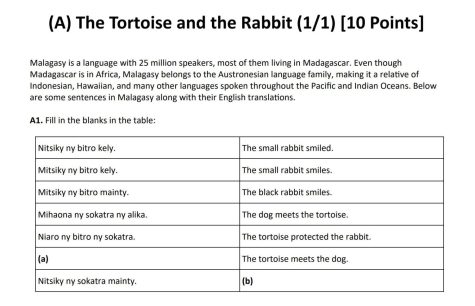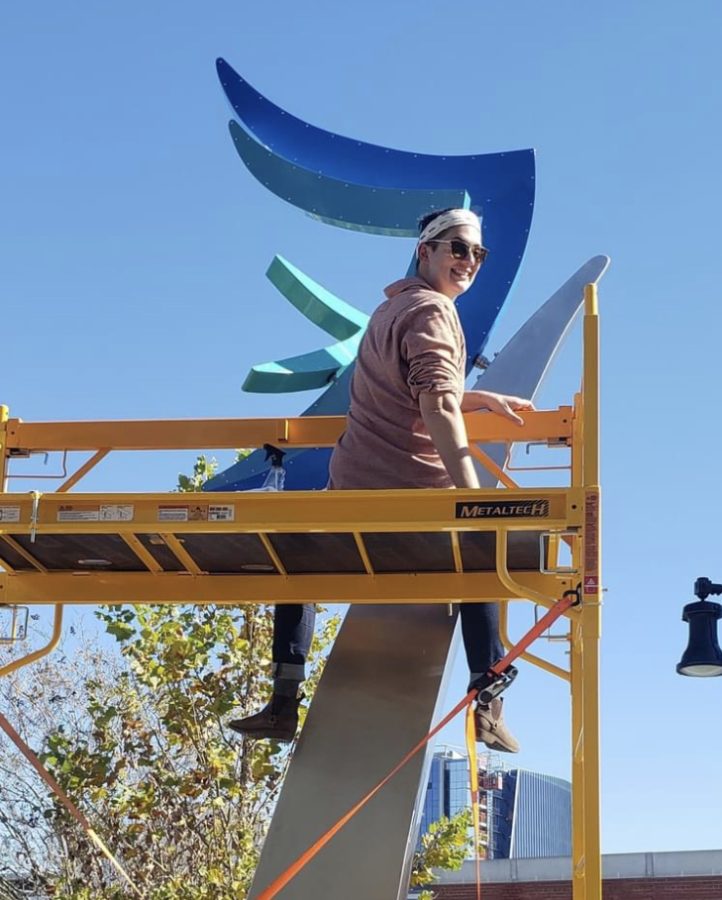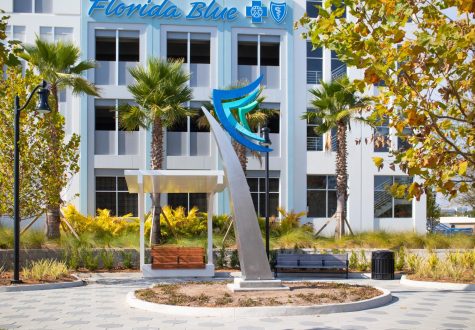6-on-6: February-March 2022
Kuonen took six months to finish her piece (featured in the Art department’s section).
Every issue, our 6-on-6 section features six short articles for each of our six academic departments. Read about each academic section below:
Math: Bolles adds up for math teacher Mr. Gomez — Ava Cheng
“Originally I wanted to be Spider-Man. But when I saw that wasn’t gonna work out…”
Around twenty years ago, Santiago Gomez switched to a math major and got his degree, deciding teaching would be a better superpower.
Gomez began teaching homeschooled teenagers while he was in college. “It wasn’t like I loved math. I liked that it made sense and was logical, and I liked the way of thinking it trains your mind to do.”
Gomez moved from Santa Rosa Valley, an hour south of San Francisco.
At the time, teachers were in short supply. “Before I even had a credential, they hired me to start working Campbell District. And I worked there until four weeks ago,” Gomez said.
Moving to a new school can be difficult, even more so as a teacher moving across the country in the middle of the year. Still, Gomez is keeping a positive attitude as he adjusts. “Bolles is great…I just came in here, met everybody and we did some non-math days because I didn’t know exactly what we were doing just yet. But the next day I figured out what we were doing, and we started doing it.”
Overall, teaching remains the same for Gomez, despite a few changes. “The job itself is the same, just different classes, part of the country. It’s figuring out stuff on the back end the students don’t see. I’m always kind of working on that, but the teaching part? It’s the same thing.”
Science: Fletcher finds her new teaching home — Sara Wasserman
Ms. Fletcher grew up in Jacksonville, on and around the water. Fletcher said her passion for all facets of biology have pushed her to grow as a teacher and a scientist.
Outside of school, the new Biology teacher loves to spend time with her family, specifically her nieces and nephews. Additionally, she loves to spend time with her 14-year-old King Charles and Long-Haired Daschund mix, Vicky, “definitely the queen of her castle.”
Fletcher describes teaching as an important opportunity to prepare students for the world and future.
“I think the opportunity to allow students to learn how to critically think is so important … You really learn how you can make your impact, whatever that may be” Fletcher said. “So, whether that’s becoming a journalist, or whether that is in science, or just in the way you interact with your fellow human beings.”
Fletcher’s experience in marine biology grew at University of North Florida, where she had the opportunity to work with aquatic toxicology in her master’s program. After the BP oil spill, she took part in researching the conditions of the environment and wildlife after the spill.
Fletcher said,”We actually got to see how everything functioned and how everything was improving over time.”
Prior to beginning her teaching career, Fletcher worked as a state and nationally-certified pharmacist technician in college She has also worked in curriculum writing and career counseling for college students as well and enjoyed her varied work experiences.
“I had the opportunity to teach college students that was a blast. I had some opportunities to write curriculum and do that kind of stuff. And that was a lot of fun.”
Overall, Fletcher’s transition to Bolles has been very smooth. “The students are absolutely excellent. And the faculty has just been so incredibly welcoming. Everybody has been so kind, and I’ve just really enjoyed it.”
Fletcher loves finding new perspectives on science and life. “It allows me to find different ways to explain things and to see the world in different ways and to not only, you know, want to challenge my students, but allow them to challenge me and allow us to kind of grow together.”
With all of her marine life experience, Fletcher narrows her favorite aspect of the subject down to the small factors that work together to create a big effect.
“I tend to like how things work together, to see how small things build to the big things,” said Fletcher. “Whenever I can see a cycle that comes through, whether I’m talking about how fish interact to allow an ecosystem to work the way it does, or anything like that, that to me is exceptional.”
Art: The building of the “Blue Crest” — Aisha Hasan
This year our school welcomed a new art teacher, Ms. Kuonen. Aside from teaching, Ms. Kuonen creates arts for the public. Recently she built a piece titled, “Blue Steel” for a significant insurance company in downtown Jacksonville. Using aluminum and stainless steel, she built her kinetic 16 ft tall structure.
From pitching the piece, to accumulating the materials, to creating the piece it took Kuonen about six months to complete the process. “Everything has its challenges, and everything has its rewards. A dear friend of mine says it’s called artwork, not art hugs. Because it’s meant to be hard work.” reveals Ms. Kuonen.
Accumulating materials bore no easy task for Kuonen. “If you’re going to cook a beautiful meal, you still have to go to the grocery store and get the ingredients, right. And we’re still living in a pandemic, so supply chains can be a little complicated right now,” states Ms. Kuonen.
To stay local was an important factor for Kuonen. “It’s important that money going into this project is also funneling into the economy here. So we worked with various suppliers here for a lot of the metal components, some of them were fine to hardware components, we worked with powder, coaters and more.”
With all the materials acquired Ms. Kuonen was set for building. The piece is kinetic, meaning many factors played into the making of the piece; she first started with a tabletop sized replica. “The process was making templates and scaling up their design involving a little bit of math. So after moving into the template process, we did probably about four or five, the kinetic tests,” explains Kuonen.
For the math and physics aspect of the piece, Kuonen and her team received help from local engineers. “We had to work with actual engineers to engineer the footings at the base. So, it was just like a step by step process that was like, they do one part and then we do a part and so on,” states Kuonen.
From July to December Kuonen and her team worked vigorously to finish “Blue Steel”. “Each day was like a set of tasks had to get done. To make sure we’re reaching our benchmark for our planned installation date,” reveals Kuonen.
Kuonen started art a few years ks a lot of boxes for me that I really enjoy. So again, it’s like, how do you continue to evolve as an artist? How do you continue to challenge yourself? Where do you find the hard work? Because that, for me, has been really important,” explains Kuonen.
English: New teacher has story to tell — Caylee Padgett
“I always knew that I’d become a teacher. I just didn’t know the route that I would take to become a teacher.” Ms. Gastaldi said, touching on her teaching journey.
She has gone from journalism in her hometown and Hollywood script reading, to teaching at The Bolles School. When she began as a journalist, she worked for a daily paper named, Citrus County Chronicle and later, interned at The Atlantic, in college.
After this, she moved to Washington D.C. and worked as an intern for The Atlantic around the time when people were transferred to digital platforms for news. She said that “The Atlantic was really struggling with how to define itself. Now that everyone was canceling their subscriptions, their print subscriptions, and going online. So I think that all of those news magazines and newspapers have found their way by now. But in the early 2000s journalism was sort of in disarray.”
While she was working with the Citrus County Chronicle, she learned a valuable lesson in the news industry. “It really taught me what you have to be like, how much do you want this? How do you want to know what kind of career in order to be? Like, what some people would call a successful but no, not everyone would call it successful.
Gastaldi decided that journalism wasn’t her ultimate career.”You have to be tenacious and ambitious. You’re going to get the story no matter what. But I didn’t have that in me.”
Gastaldi has a really great takeaway from her career as a journalist and moving to work as a teacher. “I’ll say that working as a journalist affected me as a teacher because I know how important it is to be writing, writing, writing every day, and seeing what your writing can accomplish…I know what it feels like to get useful, immediate feedback, but that is so hard to provide in the classroom is just as hard. [B]ut it can really make a difference in a young person’s life to give them really valuable feedback.”
History: Fluegel’s loved books find new home in Kenya — The Bugle Staff
Mrs. Chandler, History Department head, knew Mrs. Fluegel was a dedicated bibliophile from the moment they met. Chandler reminisced, “She was constantly talking about what she was reading.”
Mrs. Fluegel’s passing over the holiday break was a loss to the History department and our school but now her lifelong love of reading and extensive book collection serve as a memorial and a legacy for the beloved teacher.
Some of Fluegel’s books will become part of the book drive Grace Albaugh ’23 is currently organizing for Vito Moja Inc, a non-profit that alum parent Deb Maina and the Albaugh family started to support impoverished and underserved children and families in rural Kenya. In middle school, Albaugh visited and helped establish the first libraries there. (Full disclosure: Albaugh is a contributing writer for Bugle)
KT Albaugh, Grace’s mom, wrote in an email,“Mrs. Fluegel’s books and supplies are going to this cause and will end up in the hands of teachers and students in rural central Kenya.” Fluegel’s extensive collection of textbooks and primary sources will become a valuable resource.
“For perspective,” Albaugh wrote, “These kids normally share one textbook to 5-8 kids. Teachers have little to no supplies. So it’s very meaningful, Mrs. Fleugel’s materials, going to them.”
Chandler and History teacher Jen Gomez visited Fleugel’s house to help Fluegel’s family. Chandler said, “I have never seen anything like this. Every wall was covered with books.”
According to Chandler, Fluegel kept a blue binder where she logged her books, where she bought them, and whether or not a book was on sale. Chander said, “It was obviously a prized possession.”
While Chamblin’s Used Bookstory received 28 boxes of books, many of Fluegel’s books are still in her classroom and faculty and students have been encouraged to take home a book to add to their own collections. Chandler took Colson Whitehead’s novel Underground Railroad, a reading choice that reflects Fluegel’s passion for justice and equity.
Gomez cherishes three books from Fluegel’s collection: The Vietnam War in American Stories, Songs, and Poems, The Last Detective, and Yoga for Dummies.
Gomez, who teaches American history and the yoga elective, said, “I thought this book could provide more insight on songs from the Vietnam era.”
The yoga book, Gomez felt, suggested Mrs. Fluegel may have had a secret yoga life. “All these years, she never said anything to me about yoga but she must have been interested. I wish we could have taken a class together.”
Language: Four compete in National Linguistics Olympiad — The Bugle Staff
“I got to skip school to go and do a bunch of puzzles,” said Max Frohman ’22, making a three-hour test on language and logic seem as much fun as a rowdy escape room.
Four students competed in this year’s first round of the North American Computational linguistics Olympiad (NACLO). Julia Peiris ’22, Dylan Schwartz ’24, Malik Leslie ’24, and Frohman tried their hands and minds on 9 language and logic puzzles.
“Only one person had something written down for every problem,” said French and Arabic teacher Sara Phillips-Bourass. “To get to the second round, you have to be that kind of scary ‘whoa, how does your brain work?’ kind of kid.”
Phillips-Bourass proctored the NACLO competition at her previous school in Indiana. She said the Olympiad has an international reputation and is extremely popular in Eastern Europe with countries that have an interest in code-breaking. But any high-school student can sit for the test.
Phillips-Bourass said, “So you’re not expected to have any previous knowledge of any of the languages. And they’re totally solvable, just using your brain and logic.”
The test focuses on little-known languages so no particular person has the advantage of fluency.
Students take the test on paper, proctored by a teacher. A jury of linguistics professors who organize it are available to answer questions online, live during the competition, so proctors can submit their questions to them.
These linguistics professors come up with the questions based on their research or other people that they know and sort of interesting things have come across in the world’s languages. And they put it on as a way to promote linguistics among school age students.

According to Phillips-Bourass, linguistics is an under-rated field of study that can open up the world to students whether that be through preserving the endangered languages of our world or analyzing speech patterns on social media.
“There’s a lot of money being made now around automatic speech recognition, and data mining and all the algorithms that like social media uses,” said Phillips-Bourass. “How the Internet uses to language to organize stuff, all of that lies on like machine understanding of written language.”
Frohman said of his Olympiad experience, “You’re kind of wiped out but it’s not like the SAT. I was still thinking about it when it was over. Like, what about that one?” Phillips-Bourass describes it as “really fun for very nerdy people.”
She said she could imagine having like practices where people come together, we have all worked on the same problem and could talk about it. “What would it be like to be introspective about your own language?”
Results of the first round come out in February and the second round is scheduled for March.




